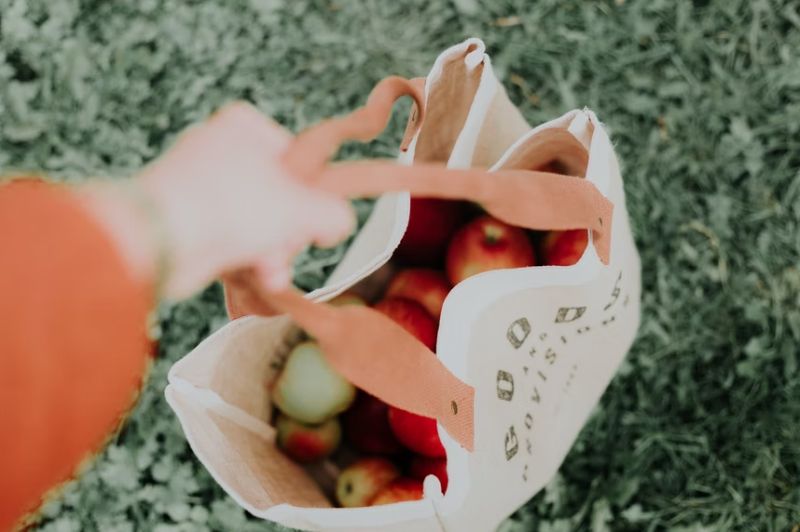Responsible consumption is not just a trend, but a way of thinking that is becoming the norm for many, and that’s amazing. Each of us can influence the consumption patterns of our society, and thanks to basic shopping habits, we can do less harm to the environment.
Did you know that “Climate emergency” was the 2019 Oxford word of the year? The ecological problems are becoming more and more serious, so everyone should start living a more mindful life.
In this article, we have collected simple, yet essential tips related to sustainable shopping. Whether you are going to buy some groceries or are looking for a new pair of jeans, keep them in mind.
1. Bring a Bag
At the first glance, this is the easiest step, but nevertheless, not everyone uses eco-bags. A simple phrase “Thank you, I don’t need a plastic bag” said at the register will bring you closer to an eco-friendly lifestyle. On average, we use a plastic bag for three hours only. After which it takes 150 years to decompose. Not only is it going to outlive tree generations, but it also releases harmful substances.
Now, there is a large selection of stylish eco-bags with cool designs, so why not take them with you before going grocery shopping?
When you go online, searching for a perfect eco-bag, you may be overwhelmed by the variety of choices. And if you lose track of time, forgetting about tasks on your to-do list, don’t worry. Authors from academic paper writing by WritePaper do know that it’s impossible to manage everything these days, that’s why they are always ready to help you with school assignments.
Any kind of paper writing, absolute anonymity, safe payments and plagiarism reports – that’s what you get when outsourcing your paper. Also, it’s a great way to save your nervous system from stressing over low grades and upcoming deadlines.
2. Support Local Producers
Try to buy products from local businesses, as transporting these goods requires less fuel and packaging. Also, fruits and vegetables from the local producers are usually not treated by chemicals. As a result, you support businesses in your country and get the freshest produce possible.
3. Carry a Mug
Disposable cups, lids and straws not only pollute the environment. They can release toxic substances upon contact with hot liquids as well. That is why it’s recommended to come to cafes with a reusable mug or thermos.
By the way, many coffee houses provide an additional discount when buying tea or coffee in your cup. This is a super easy way to save money and take a small step towards reducing plastic pollution. So, next time you come to the coffee shop to work on your research paper, be sure to grab a thermos (and perhaps a straw made of metal and stainless steel).
4. Choose Eco-Packaging
Some products in supermarkets have recycled packaging indicated by a round or triangular arrow icon. Such boxes are much more environmentally friendly. They are recycled over and over again, which means they do less harm to the environment.
5. Plan Your Shopping In Detail
Thinking through your diet in advance has two advantages. First, you will greatly save time on shopping and second, it prevents you from irresponsible spending. Before going to the store, make a shopping plan and stick to it. Less unnecessary products – less unnecessary packaging.
Sounds amazing, right? Moreover, proper planning is closely related to a more productive life – aren’t you interested in wise time management and stress-free days?
6. Buy What You Need
The cornerstone of mindful shopping is to buy what you really need. Your life will not become much better with another t-shirt or a fifth pair of sneakers. Where will you wear them? Don’t take millions of things into the fitting room that will later lie untouched in your closet. Better focus on the basic wardrobe. Remember: the classic will never be out of fashion.
7. Be Mindful About Materials
Have you heard that the production of artificial fabrics is based on oil and gas? These are non-renewable natural resources. In addition, such fabrics have lots of disadvantages. They don’t allow air to pass through, can cause allergies and are poorly processed.
That is why it’s better to select clothes made from organic cotton, linen, hemp or nettle. Such natural fabrics are later handed over to factories or car washes, where rags are often needed. At the same time, nylon and rayon are best avoided.
Choose clothes made from recycled materials, be it a hoodie made from recycled milk cartons, or a t-shirt made from bottles. Recycling is quite trendy today. Surely, as kids, many of us have tried to create new clothes from old items we got tired of wearing, and that’s exactly what designers do now.
8. Take a Closer Look At Thrift Stores

We are often unsatisfied with the quality of things sold in the mass market. At the same time, clothes of famous brands are expensive, so second hand stores are a good solution. There, you can stumble upon a real treasure, be it a thing from limited collections or a gorgeous-looking vintage. This way, you kill two birds with one stone – you buy what you want, taking care of the planet.
9. Learn As Much As You Can About The Brand
Some companies produce clothes in quite modern factories with a wastewater treatment system and solar panels. Others willingly share information about their suppliers and all materials. Knowing such details, you will make the right decision about the future purchase.
10. Look For Authenticity Signs
Organic clothing is easy to find, but there’s a catch. Organic cotton doesn’t guarantee it’s free from toxic chemicals. Therefore, it is crucial to check whether the brand meets eco-standards. Learn it by studying the logos: look for «Oeko Tex», «Global Organic Textile Standard», «Global Recycle Standard», «Fairtrade» or «Bluesign». To receive these certificates, products must pass strict control procedures.
11. Rent Instead Of Buying
Sometimes we enthusiastically search for something expensive for a special occasion. And then, when the night is over, the item gets forgotten at the far corner of the closet. So why not rent a stunning outfit from a friend, or one of the clothing rental platforms? You’ll get the desired look for much less money and with no damage to the environment.
Conclusion
We are all used to the abundance of cheap things and thus, we often perceive shopping as a way to get rid of tension. However, mindless purchases are fading into the past. Whether you’re looking for a basic sweater or a special outfit, you can easily find clothes made from recycled or organic materials. Responsible shopping doesn’t require much effort. It’s a win-win situation: ethical companies become more popular, large manufacturers aim to be more environmentally friendly, and you get good-quality things at affordable prices.
More and more consumers want to look good, feel good and do good. And mindful shopping becomes the key to this.
Article Submitted By Community Writer


